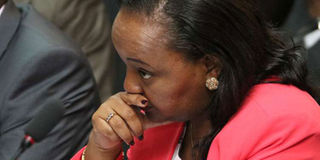Why Waiguru may have learnt to be streetwise too late

Former Devolution Cabinet Secretary Anne Waiguru before the National Assembly Public Accounts Committee on November 4, 2015. Ms Waiguru started her working life as a clerk in a small firm in Nairobi, earning Sh6,000. PHOTO | JEFF ANGOTE | NATION MEDIA GROUP
What you need to know:
- She gave the interview just before the issues at the National Youth Service grew into a scandal, before the accidental revelations of inflated expenses at her ministry and before she became the target of an impeachment Motion.
- Ms Waiguru entered the Civil Service on the secondment of the World Bank as a technical adviser in the Cabinet office on issues of governance, leadership and reforms in the public sector.
- Six and a half ministries in the Kibaki administration were combined to form the Devolution and Planning Ministry, putting Ms Waiguru at the head of a powerful new docket.
As the adage goes, to get someone to speak from their heart, allow them to do it in their first language.
When Ms Anne Waiguru was asked by a reporter for Kikuyu language channel Inooro TV to give advice to young women who wish to rise to the top, she said: “From what I have seen over the past two years, you need to be streetwise to survive in this country.”
She gave the interview just before the issues at the National Youth Service grew into a scandal, before the accidental revelations of inflated expenses at her ministry and before she became the target of an impeachment Motion.
By the time she was leaving office on November 21, her lessons on the survival game had ended and her doctor had advised her to take “lighter duties” to save herself from harm.
The graduate of Egerton University and the University of Nairobi had run out of steam, leaving the public service she entered with plenty of promise a beaten person.
She had certainly gained experience, starting out as a relatively unknown technocrat when she was appointed Cabinet Secretary for Devolution and Planning in 2013 to a divisive figure before she left office.
Ms Waiguru started her working life as a clerk in a small firm in Nairobi, earning Sh6,000.
She later worked at Kenya Leadership Institute, a non-governmental organisation, before moving to the World Bank as the Eastern Africa Regional Representative for the Parliamentary Network.
Ms Waiguru entered the Civil Service on the secondment of the World Bank as a technical adviser in the Cabinet office on issues of governance, leadership and reforms in the public sector.
When Mr John Githongo made his dramatic walk-out from the government to reveal the Anglo Leasing scandal, she replaced him as head of Governance.
A FORMIDABLE INDIVIDUAL
President Kenyatta worked with her when he was Finance minister and she was overseeing the implementation of the Integrated Financial Management and Information System (Ifmis).
A driven hard worker with a history of success, good writing and communication skills and an ability to communicate her vision, she had caught the eye of observers as someone who could deliver.
She showed promise and even as the rumours swirled around her, she kept a smile on her face and continued to speak clearly and forcefully.
Six and a half ministries in the Kibaki administration were combined to form the Devolution and Planning Ministry, putting Ms Waiguru at the head of a powerful new docket.
Her signature projects were Huduma Centres and the National Youth Service.
Those who have worked with her describe her as a person who demands results and clear plans.
In the corridors of power, she was referred to as the “third principal” and “prime minister”.
This was in reference to the power she wielded and the perception that she enjoyed favour from President Kenyatta.
He reinforced this when he attended her homecoming party.
That perception gained credence over time, with President Kenyatta applauding her often for doing a good job. She also received several awards on behalf of the ministry.
As the political war broke out and the pressure to have her leave grew, there was a bitter personalised war among central Kenya MPs.
Some leaders questioned why she refused to take responsibility when revelations of theft and questionable spending were made.
President Kenyatta is yet to act on her request for lighter duties.





